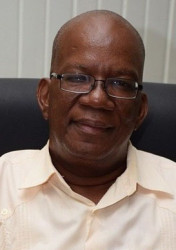Guyana is currently experiencing a reduction in free spending due to a decrease in illegal activities, including narco trafficking, which had created a parallel economy here, Minister of Finance Winston Jordan said over the weekend.
The minister, who was at the time speaking to the Government Information Agency (GINA) on the APNU+AFC coalition’s first year in office, said too that it will take time for the economy to improve and adjust.
Jordan, during the interview, agreed that the economy is not as buoyant as it needs to be, while noting that illicit drugs and other illegal activities had helped create a parallel economy.

“So the more that you go after that, and the more it will miniaturise, that is the less free spending you will see… it’s going to take a time for the economy to get comfortable with that, but in the meanwhile we will be putting other incentives to stimulate growth in the economy, but one good thing we can say, the economy will grow,” he was quoted as saying.
According to GINA, the minister projects economic growth but hastened to point out that Guyana is not on track to achieve a 7% growth in the medium-term. “We are not going to grow by 7% if we continue to do the same things we were doing 50 years ago. To achieve such growth, the country needs to move from the ‘tripod’ of rice, sugar and bauxite, which it depended on for the last five decades with gold added to this mix. The country needs to focus on adding value to its commodities, by taking production to the tertiary level, diversifying agriculture, and modernising productive methods,” he posited.
Noting that earnings from bauxite would be affected by a sluggish global economy, Jordan opined that Guyana has to make better use of its gold, including adding value. “We necessarily can’t control the ones that are being done by the multilateral agencies, but we can entice them to do another stage of the gold; gold bars for example might be good, coins…,” he suggested.
Turning his attention to new industries, the minister said it is necessary to have fresh industries coming on stream and cautioned against getting too excited about petroleum exploitation. “We ought not to get ourselves way ahead of that. We have existing areas that new industries farmed out, particularly in the services sector. To get the services sector going, people have to be trained and adapted to what the market wants,” he noted.
Jordan described his tenure thus far as “challenging but rewarding.”
He said when he took office as Minister of Finance, he soon found out things were not so “kosher” and within weeks of being in office, the government was faced with domestic and international issues.
“… Sugar was worse than it was actually made out, and right away, we had to save jobs and save the industry by trying to find over $12 billion just as a quick cash transfer to the sugar industry,” Jordan recalled.
He noted that, simultaneously, the government had to divert much needed resources to “internationalise” Venezuela’s spurious claim on Guyana. This was even as the new administration was forced to find the money to pay farmers for rice already shipped to Venezuela after that country ended the rice for oil deal.
However, the minister did not paint a totally gloomy picture as he recalled some rewarding times. “We did some incredible things. We were able to bring out the (2015) budget fairly quickly and the last one, 2016, being one of the earliest in recent times. We were able to make good on some of our promises in whole or in part. We did quite a bit for pensioners, public sector workers benefited somewhat, we were able to restore collective bargaining, … Critchlow Labour College had some of their subventions restored, and some trade unions were given money for training,” he told GINA.
He also mentioned programmes to link the coast with the hinterland, the climate resilient programme and the greening of the economy. “There are a number of challenges, of course, and at the end of the day, one year after, I figure I have more grey hairs,” he said.
Among the other areas he touched on while speaking to GINA were revenue collection, the Financial Intelligence Unit (FIU) and the state of the treasury.





